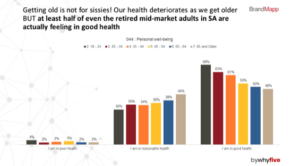In the aftermath of COVID-19, a health scare, global in scale and far-reaching in its local impacts, South Africa’s middle to top-end of the market are today feeling pretty good about their health. This is according to the recently released BrandMap 2023, a massive survey of South Africans living in households with a monthly income of R10 000+, who represent 100% of the personal tax base in the country. If they are not alive and well, we are all in trouble, and the good news is that 59% of respondents reported that they were in good health, while a further 35% defined their health as “reasonable” and only 2% say they are experiencing poor health.
“You have to begin by understanding where ’good health’ sits in our collective mind,” says BrandMapp’s Director of Storytelling, Brandon de Kock. “Year after year, we see that 75% of BrandMapp respondents are physically active and the rest are either unable to exercise or chose not to do so: elective couch-potatoes if you will! But the primary difference is that 25% of inactive adults are significantly less likely to think that being fit and leading a healthy lifestyle is actually important in life. So it all starts with a mindset, and after that, it’s over to Mother Nature.”

When we apply an age filter to the data, we clearly see health deteriorating as people get older, but at least half of even the retired adults are actually feeling like they are in good health. On the other hand, it is interesting that 4% of young South Africans say that they are in poor health and that happens to be double that of the oldest people. This is mirrored in other results from BrandMapp 2023, where younger people were twice as likely to say that they are living with mental health conditions.

If you can afford to pay tax, you can afford a healthier diet

Perhaps because they are able to make better choices about health and diet, there are some noticeable health differentiators for this segment of SA society, for example, the fact that only 4% are living with diabetes when the International Diabetes Federation measures an 11.3% prevalence of diabetes in all South African adults. “These kinds of skews can be partially explained by their ability to make healthier decisions about what’s going in the shopping trolley,” explains de Kock. “For example, 48% of respondents say that they are going to be cutting down on sugar in the year to come, 23% are thinking about adopting a low carb diet and 18% want to cut down on their meat consumption. Being able to make healthier choices is one of the great privileges of being in the top 30% of households.”
So, what are the main ailments of SA’s mid to top-earners?

But when it comes to the kind of conditions that are not necessarily or exclusively linked to diet and lifestyle choices, a different picture emerges. Of the 2% of people who are in poor health, chronic disease is the primary complaint with 20% of respondents afflicted. 15% of the respondents currently in poor health reported that they are suffering from mental health conditions, and this far exceeds the rates of people with diabetes at 10%, heart conditions at 7% and cancer at 4%.
Yes, our health and happiness are intrinsically linked

De Kock says, “There are plenty of studies that show that our physical health influences our sense of well-being, and that feeling healthy is good for us, improving mood and boosting overall happiness. BrandMapp 2023 certainly backs this up with a significant majority of people in good health who are happy while the overwhelming majority of people who are in poor health are unhappy.”
But, do health and wealth go hand in hand too?

“We are also inclined to think that health and wealth must also be as strongly linked,” says De Kock. “After all, access to quality health services and products is easier, as is adopting the elements of a healthy lifestyle. So, it is interesting to see these links might be more tenuous than the connections between health and happiness. Perhaps, because you can’t buy yourself out of a chronic disease? What BrandMapp shows is that 68% of the wealthiest of South Africans say they are in good health. However, 63% of the lowest earners in the middle market are just as confident about their good health, and that’s a higher rate than any of the income levels between them and the very top.”
The ability to react is what really makes the difference
BrandMapp 2023 insights are now available directly from the BrandMapp team at WhyFive Insights and by subscription via Telmar, Softcopy, Nielsen and Eighty20. For data access email Julie-anne@whyfive.co.za
Visit www.Whyfive.co.za for an overview of what’s in the new data.





